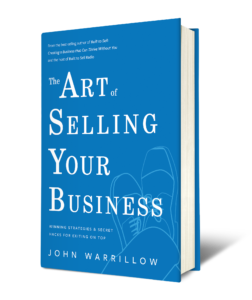
The Psychology of Selling – Are You Sure You’re Ready?

More than likely, selling your business is one of the biggest decisions of your life. Unless you own a business, it is impossible to understand just how all-encompassing of a process it can be. With that stated, it is important for business owners to step back and seriously reflect on whether or not they are truly ready to sell. The psychological aspects of selling are not trivial. Various aspects must be taken into consideration before initiating the process to sell.
There are many reasons why it is vital to step back and think about whether or not you are really ready to sell your business. Far too many business owners believe they are ready to sell, only to discover (much too late) that an executed sale is not optimal for their plans.
Selling When There is No Other Choice
Selling a business because there is no other choice, such as situations concerning failing health, personal issues or problems with a business partner, isn’t a true choice at all. In this situation, the psychology of selling is essentially irrelevant, as you have one option, namely, to sell.
The Case of Burnout
In other cases, owners eventually hit a brick wall and have no choice but to consider selling. As burnout sets in, owners may feel that the time is right to “hang up their hat” and put their business up for sale. However, as the process evolves, even those experiencing some level of burnout can discover that they are not emotionally or psychologically ready to sell. In many cases, people make this realization only once it is too late.
Take the Time for Self-Reflection
Quite often, a company becomes interwoven into a business owner’s sense of self, sense of place in the world and even, to an extent, sense of self-worth and identity. When business owners are unaware of this fact, it can be something of a shock to their system to begin the sales process. Many people simply are unaware of the strong hold that their business has on them.
Owners need to invest some time in self-reflection and ask four key questions: Do I really want to sell? If the answer is yes, then why do I want to sell? Will I regret selling once my business is sold? What will I do after I have sold my business? Answering these questions involves far more than evaluating your business. They also involve diving into emotional issues that could be central to your future.
Are You Really Ready to Sell?
One of the best ways of determining whether you are ready to sell, and preparing your business for that potential sale, is to work with a business broker or M&A advisor. Business brokers are experts at helping business owners deal with every aspect of the process of selling a business. They can act as experienced guides that can use that experience and expertise to help you determine if you are truly ready to sell.
If it turns out that you are indeed ready to sell, a brokerage professional can help you prepare so that you can achieve the best price possible once your business hits the market.
Copyright: Business Brokerage Press, Inc.
The post The Psychology of Selling – Are You Sure You’re Ready? appeared first on Deal Studio – Automate, accelerate and elevate your deal making.

When Should You Think About Selling Your Small Business?

There are many reasons why small companies are put up for sale. Some of the more common reasons can actually have little to do with the company’s general performance. For example, many small business owners discover that they need to sell for health reasons or personal concerns, such as divorce or partnership issues. While a business downturn or fear of a larger competitor looming on the horizon might prompt many business owners to sell, economic drivers are not the only issue. Owners may want and need to sell, but often it isn’t always that simple.
Many business owners are looking to retire, but are unpleasantly surprised to learn that they simply can’t afford to do so. Still yet, many business owners don’t truly want to retire or sell, but instead they just want more freedom in their lives. The day-to-day responsibilities of owning and operating a small business can take their toll. Many business owners are looking to make a change and would love to be free of this burden. This class of owner has already “checked out” mentally, and this can have profound negative consequences for their businesses.
When an owner wants out but discovers that he or she simply can’t afford to sell or retire, it will come as no surprise that there is usually an accompanying drop off in enthusiasm. Ultimately, the vast majority of owners will start to lose focus. Often, we find that they stop investing the capital necessary to continue the growth of the business, which can trigger other events, such as the loss of key staff members and/or customers. Losing a top customer to a major competitor can further accelerate the downward spiral. The failure of the business to maintain its footing and competitive advantage can lead to a more aggressive posture by existing competitors or even encourage a new competitor to move into the market.
In time, the owner may come face-to-face with the harsh realization that they have no choice but to sell if they are to salvage any of the business’s value. The best way for a business owner to safeguard against this situation is to sell when his or her business is doing well, as this helps to ensure an optimal price.
Working with a business broker, even years before one is interested in selling, is one of the single smartest moves any business owner can make. The time to think about selling your business is now, as no small business owner knows what life or the market will bring.
Copyright: Business Brokerage Press, Inc.
The post When Should You Think About Selling Your Small Business? appeared first on Deal Studio – Automate, accelerate and elevate your deal making.

Is Your Business Charging Enough For Goods & Services?

A small increase in what you charge for your goods and services can make a tremendous difference to your bottom line. The fact is that many businesses could charge more for their goods and services than they do, but fail to do so. Owners often do not realize the great value of charging just one-percent more. In this article, we’ll explore how charging even slightly more can dramatically impact your business.
Let’s consider a hypothetical example. A business owner tells a potential buyer that he or she could safely increase their prices by 1.5% and do so without the price increase causing any negative impact to sales or business disruption. The savvy buyer quickly realizes that the business, which has $70 million in sales, is leaving $1 million dollars on the table by not increasing its prices by 1.5%. A smart buyer realizes that after purchasing the business, all he or she has to do is institute this small price increase in order to achieve a sizable increase in profits.
In his best-selling book The Art of Pricing, Rafi Mohammed explores the often-overlooked area of pricing. He keenly observes that one of the biggest fallacies in all of business is to believe that a product’s price should be based on the cost of the product. In The Art of Pricing, Mohammed points to several examples. One comes from the restaurant industry. He points to the fact that McDonald’s keeps entrée prices attractive with the idea of making up profit shortfalls in other areas, ranging from desserts to drinks and more. Or as Mohammed points out, McDonald’s profits on hamburgers is marginal. However, its profits on French fries are considerable.
Mohammed’s view is that companies should always be looking to develop a culture of producing profits. He states, “through better pricing, companies can increase profits and generate growth.” Importantly, Mohammed points out that it is through what he calls “smart pricing” that it is possible to extract hidden profits from a business. Summed up another way, pricing couldn’t matter more.
All too often business owners, in the course of their day-to-day operations, fail to place sufficient importance of pricing. Any business looking to achieve more will be well served by first stopping and taking a good look at its pricing structure.
Likewise, buyers should be vigilant in their quest to find businesses that can safely increase prices without experiencing any disruption. At the end of the day, small changes to pricing can have a profound impact on a company’s bottom line.
Copyright: Business Brokerage Press, Inc.
The post Is Your Business Charging Enough For Goods & Services? appeared first on Deal Studio – Automate, accelerate and elevate your deal making.

3 Steps for Achieving Pricing Power

The simple fact is that most of us want to control our own fate. This fact is especially true for entrepreneurs and business owners. However, the truth of the matter is that for most business owners, their fate isn’t completely in their own hands. For example, a variety of forces can prevent businesses from establishing their own prices.
Knowing whether or not your company has pricing power is essential and can influence a range of decisions that you may make. Let’s take a closer look at what steps you can take to control your own pricing.
What is Pricing Power?
This economic term describes the effect of a change in a product price on the demanded quantity of said product. Your company’s pricing power is linked to the demand for your products or services. If you have a high level of pricing power, you can raise your prices over time and maintain your customers.
Who Has the Greatest Pricing Power?
It is no great secret that the Amazons, Apples, Wal-Marts and auto manufacturers of the world exercise a tremendous amount of power. Part of this considerable, and seemingly ever growing, power resides in the fact that the size of these companies now rivals and even surpasses many nation states. This grand level of power is unique in human history in many ways. Along with it comes the ability to exercise an almost god-like authority over suppliers.
Today, these ultra-powerful companies commonly dictate to vendors what prices they are willing to pay, and the quasi-monopolistic nature of these companies often leaves vendors with no choice to comply. In short, these 900-pound gorillas are telling companies both large and small exactly how much they will pay for a given number of bananas.
Step 1 – Providing a Branded Product or Service
If you discover that your company doesn’t have pricing power, there are steps you can take. One step is to produce a branded product or service. In this way, you are able to offer something of greater value than your competitors. Through having a branded product or service, it is possible to create a higher perceived value in the minds of not just the Amazons of the world, but in the minds of consumers as well.
Step 2 – Innovating
Another path towards achieving pricing power is through innovation. A great example of leading the way in innovation is Apple. While few companies have Apple’s almost ethereal resources, that is not to say that you cannot find ways to innovate within your own sphere or industry. Small innovations can often have an outsized impact and help a business stand out from a crowded playing field. Innovation that leads to patent production is an excellent way to gain a degree of pricing power.
Step 3 – Offering Exceptional Service
A third option for achieving a degree of pricing power is to provide what could be called “mind-blowing” service. By providing service that is truly a cut above what the competitors can match, your company is positioned to achieve pricing power. Providing your customers with something they simply can’t get elsewhere is a key way to setting a price that is more in line with what you desire.
There are many marketplace variables that your business can’t control. The trick is to evaluate your business, your business’s potential and the concrete and practical steps you can take starting today to achieve pricing power.
Copyright: Business Brokerage Press, Inc.
The post 3 Steps for Achieving Pricing Power appeared first on Deal Studio – Automate, accelerate and elevate your deal making.

John Warrilow’s The Art of Selling Your Business

John Warrilow is the founder of The Value Builder System and accomplished author. While not a business broker himself, Warrilow has gathered considerable knowledge and expertise on the industry. His previous book Built to Sell was listed as one of the best business books of 2011. In this article, we will explore some of the key points in Warrilow’s latest book, which is entitled The Art of Selling Your Business: Winning Strategies and Secret Hacks for Exiting on Top. This book was released on January 12th, 2021 and is proving to be invaluable for business owners.
Selling When the Time is Right
One key focal point of the book is that business owners should skip trying to find the perfect “magical time” to sell their business. Additionally, Warrilow notes, “I make the strong recommendation in the book that the best time to sell your company is not during some mysterious macroeconomic environment. It is when someone is willing to buy it and you get an offer. And that is because at that point, you’re in the position of strength.”
The DIY Approach
This book reinforces the fact that business owners truly need to work with an intermediary if they are to achieve optimal results. Warrilow even includes his six reasons for why every business owner should hire a business broker or M&A advisor.
Many business owners think that they can simply handle selling their business on their own. But the simple fact is that business owners usually have no experience in selling a business. Add this to the fact that selling their business is likely to be the most important financial decision the business owner ever makes, and it quickly becomes clear that business owners are doing themselves a considerable disservice when they opt to handle everything on their own.
A Business Broker vs. a Lawyer
As Warrilow points out, oftentimes business owners think that rather than working with a business broker or M&A advisor, they can turn to a trusted lawyer who has served them in the past. But this thinking is flawed when it comes to successfully selling a business. As Warrilow states, “a lawyer, almost by default, is going to be very conservative as everything exposes a lawyer to risk. And that is why using a traditional attorney is almost always a mistake.”
If you are planning to sell your business now or in the future, a book like Warrilow’s The Art of Selling Your Business: Winning Strategies and Secret Hacks for Exiting on Top can serve as a uniquely valuable tool in your toolbox.

Copyright: Business Brokerage Press, Inc.
The post John Warrilow’s The Art of Selling Your Business appeared first on Deal Studio – Automate, accelerate and elevate your deal making.
